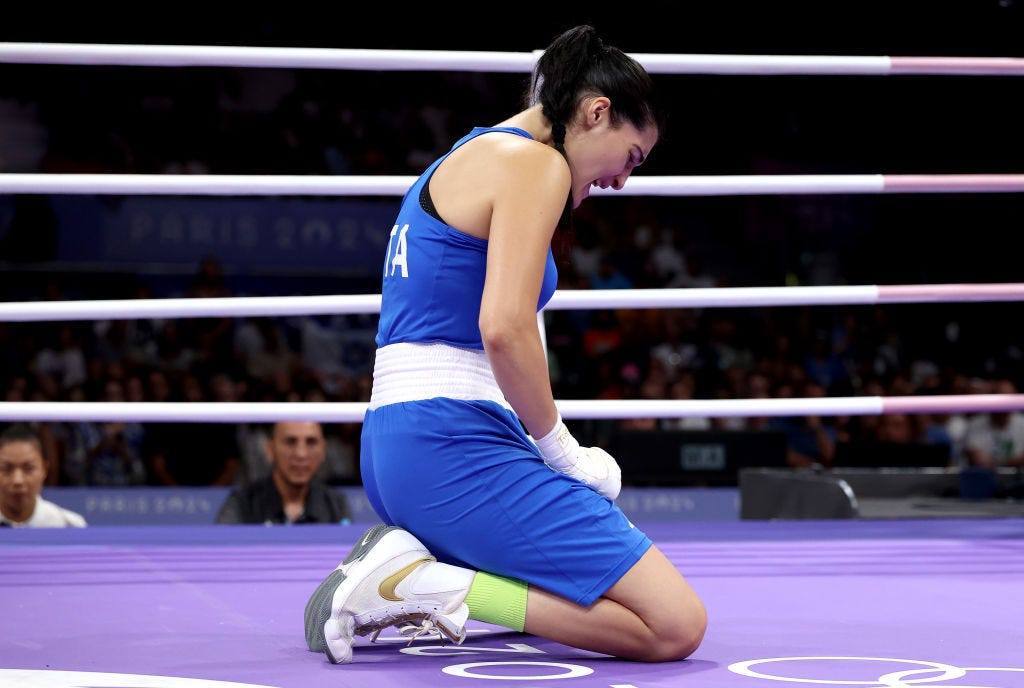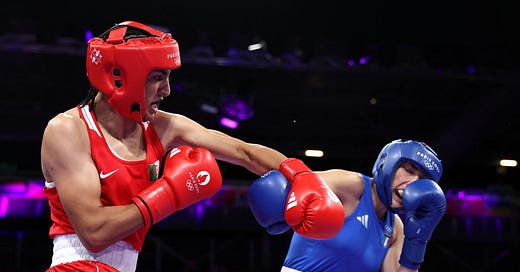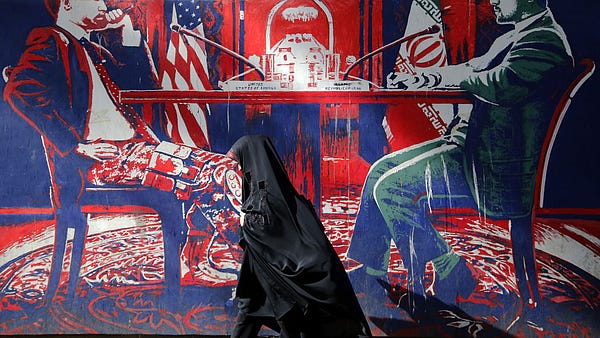
The Free Press

An unprecedented scene unfolded at the Paris Olympics today. In a boxing ring two contestants were announced: a woman from Italy and an opponent from Algeria who only last year failed a sex test and was barred from competing against women.
After just 46 seconds of fighting and two blows to the face, Italy’s Angela Carini immediately abandoned the bout against Algeria’s Imane Khelif. Carini broke down in tears, saying Non è giusto. Non è giusto!
Translation: “It’s not fair. It’s not fair!”
Later, in an interview, Carini said: “I have never been hit so hard in my life.” She wept as she described how she had to give up on her dream for gold, which she had pursued in the memory of her dead father. “Until the end, I fought with blood in my eyes because I wanted this victory at all costs. Just for my father.” Khelif will now advance to the quarterfinals.
How did we get to this point?
For the first time in history, the International Olympics Committee this year has permitted two athletes whose sex is unclear to compete in the women’s boxing championships. In addition to Khelif, competing in the 66 kg category, there is Lin Yu-Ting of Taiwan, competing in the 57 kg category.
This is happening even though Khelif and Lin were disqualified from the 2023 Women’s World Boxing Championships last year after the president of the International Boxing Association (IBA) said DNA tests “proved they had XY chromosomes.”

But the International Olympics Committee has given the boxers the go-ahead because, according to the IOC spokesman, “everyone competing in the women’s category is complying with the competition eligibility rules.” Those eligibility rules are “incredibly complex,” he added.
What he didn’t say: the IOC’s rules appear to be colored by gender ideology. According to the body’s “Portrayal Guidelines” for members of the media, the terms biologically male and biologically female are “problematic,” and “a person’s sex category is not assigned based on genetics alone.”
In 2023, the president of the International Boxing Association announced that “a series of DNA tests” had “uncovered athletes who were trying to fool their colleagues and pretended to be women.” Speaking to an Algerian TV network, Khelif rejected the IBA disqualification as a “big conspiracy.” Despite speculation, neither Khelif nor Lin has claimed transgender status or a disorder of sex development (DSD)—medical conditions in which reproductive organs and genitals develop abnormally.
Regardless of their reasons for letting these particular athletes into the ring with women, critics say the IOC is putting female athletes in danger. “Males—however they identify—pack a punch that is 162 percent more powerful than women—THE biggest performance gap between men and women,” Nancy Hogshead, an American Olympic gold medalist, posted on X. “Gender ideology will get women KILLED.”
One female boxer, Brianda Tamara, recalls how difficult it was fighting with Khelif in a previous tournament. “Her blows hurt me a lot, I don’t think I had ever felt like that in my 13 years as a boxer, nor in my sparring with men,” Tamara wrote on X. “Thank God that day I got out of the ring safely.”
Asked about Khelif and Lin’s participation in the Olympics, Mark Adams, the IOC spokesman, said at a press conference, “I am not going to comment on individuals.” Then he went on to comment on individuals, saying: “They are women in their passports and it is stated that is the case.”
No matter what their passports say, if the athletes have XY chromosomes, “that means they’re male and they have no business competing in the women’s category,” Kara Dansky, feminist, lawyer, and author of The Reckoning: How the Democrats and the Left Betrayed Women and Girls tells The Free Press.
“This is nothing other than male violence against women for sport and entertainment,” she says.
It’s also bloody unfair.
Madeleine Kearns is an associate editor at The Free Press. Follow her on X @madeleinekearns. Read her piece “Biden’s Supreme Court Reforms Are Unconstitutional.”
To support more of our work, become a Free Press subscriber today:














This gender/sex debacle is the single most baffling and nutty “woke” issue. How did we get from Title 9 - the 1972 federal law establishing women’s sports in schools to ensure women equal rights to play women’s sports (as men had long enjoyed men’s sports) - to this Krazy business that dissolves that law and allows men to compete w women? The whole point of Title 9 was to establish and protect women’s sports. And why does everyone refer to men who do this as women? Why is Khalif referred to as a “she”? He is free to pursue his sexuality as he wishes, but he should not be free to compete in women’s sports. Because he is not, in fact, a women. And he should not be able to dictate language and expression by the vast majority of the population that has common sense. Does it all come down to not “offending” him by referring to him as a man and preventing him from entering women’s sports? Really? And his supposed feeling of offense outweighs the interest of real women to compete against each other? Any sensible fellow in that situation wouldn’t actually be offended anyway. He knows perfectly well he is a man. The whole thing is a blizzard of foolishness.
Are we sure she tested positive for XY? I'm reading different reporting on this. "Unspecified gender test" is what I see IBA reporting.
Do we know her masculinization occurred via a Y chromosome vs adrenal? could she be XX with adrenal hyperplasia?
Even for rare patients with XY, one can be indistinguishable from female phenotype with Complete Androgen Insensitivity (for the sticklers, of course she wouldn't have a uterus or ovaries, I'm strictly referring to external phenotype that would impact sex-specific spaces and sports, not her medical care). There would be no reason to put an XY female with CAIS into the male division. That person would be at risk in that scenario.
This is not a clear cut transgender female who went through male puberty, competed as an adult in their sport and then transitioned, which obviously is abhorrent.
I don't know that this situation should be forced through the culture war filter until we know more.
what's clear though, boxing oversight is a shit show.